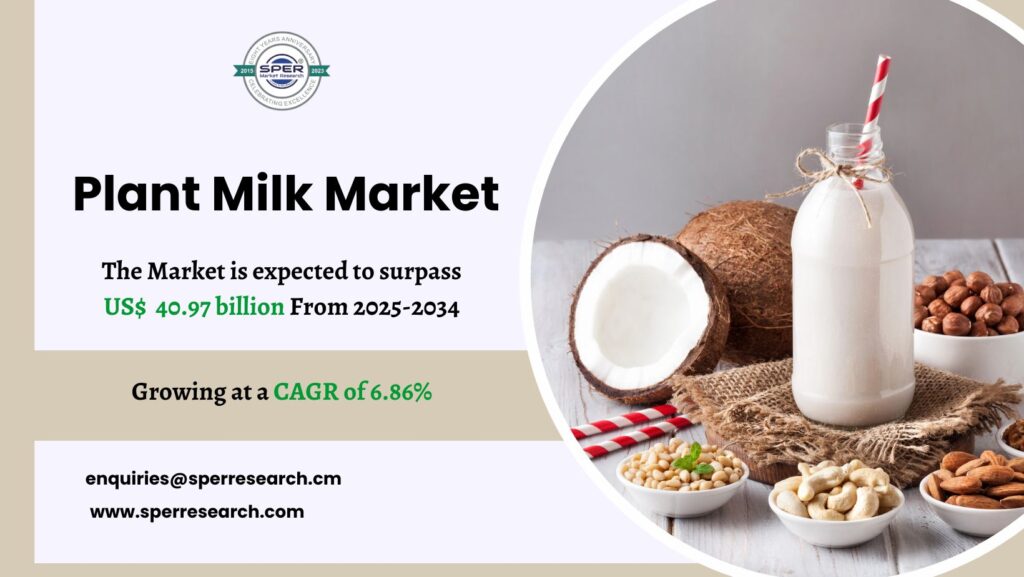Plant Milk Market Size, Growth and Future Opportunities 2034

Plant milk also known as plant-based milk or non-dairy milk, is a liquid food product made by extracting plant material in water. It is occasionally enhanced with additional ingredients to improve its texture, flavor, and nutritional content. It is used in place of traditional animal-based milk by people who are vegan, lactose intolerant, allergic to dairy, or searching for healthier or more ecologically friendly alternatives. Common plant milk sources include cashews, hemp, flaxseeds, soybeans, oats, rice, and almonds. These ingredients are combined with water and sometimes filtered to achieve a milk-like consistency.
According to SPER market research, ‘Global Plant Milk Market Size- By Source, By Distribution Channel, By Formulation, By Packaging – Regional Outlook, Competitive Strategies and Segment Forecast to 2034’ state that the Global Plant Milk Market is predicted to reach 40.97 billion by 2034 with a CAGR of 6.86%.
Drivers:
The global plant milk market is expanding quickly due to several key growth factors. Growing consumer awareness of plant milk’s health benefits, such as its capacity to avoid dairy allergies, alleviate lactose intolerance, and lower consumption of saturated fat and cholesterol, is one of the primary drivers. As vegan, flexitarian, and ethically driven diets gain popularity, consumers are turning more and more toward sustainable dairy alternatives. Nowadays, nutritional fortification—which includes adding calcium, vitamin D, B12, protein blends, and omega-3 fatty acids—allows plant milks to match or even surpass traditional dairy in terms of perceived nutritional value.
Download the detailed analysis in PDF format, Here
Restraints:
The global plant milk business faces many major obstacles to broader acceptance. The first major barrier is still price competitiveness. Plant-based milks are generally more expensive than dairy milk because of higher manufacturing costs, sourcing limitations for raw materials, and restricted economies of scale. They are less accessible due to this price difference, especially in places where customers are cost-conscious. Furthermore, there are still problems with how people perceive nutrition. Despite fortification, many customers believe that plant milks lack essential vitamins, calcium, and protein compared to traditional dairy.
The market for plant milk is dominated by North America. As consumers’ health concerns increase, plant-based alternatives are becoming more and more popular in the region. Some of the key market players are, Blue Diamond Growers, Califia Farms, Danone, Elmhurst 1925, Mooala, and others.
For More Information, refer to below link: –
Related Reports:
Saudi Arabia Soft Drinks Market Size
Follow Us –
LinkedIn | Instagram | Facebook | Twitter
Contact Us:
Sara Lopes, Business Consultant — USA
SPER Market Research
enquiries@sperresearch.com
+1–347–460–2899





